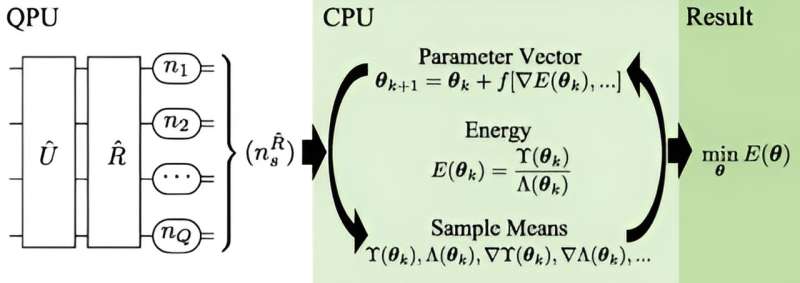In the realm of quantum science, where the boundaries between classical and quantum physics blur, researchers at the U.S. Naval Research Laboratory have achieved a breakthrough with the development of the Cascaded Variational Quantum Eigensolver algorithm. Published in a recent issue of Physical Review Research, the CVQE algorithm represents a monumental leap forward in computational capabilities, promising to revolutionize the study of electronic systems and pave the way for advancements in material science and chemistry. This article delves into the intricacies of the CVQE algorithm, its implications for scientific discovery, and its potential to transform defense technologies.
Unlocking the Power of Quantum Computing: At the heart of the CVQE algorithm lies the concept of quantum computing, a revolutionary approach that harnesses the principles of quantum mechanics to perform computations at speeds unimaginable with classical computers. Unlike classical bits, which exist in either a 0 or 1 state, quantum bits, or qubits, can exist in a superposition of states, enabling them to process vast amounts of information simultaneously. Leveraging this quantum parallelism, the CVQE algorithm offers a novel approach to solving complex problems in electronic structure theory and computational chemistry.
The CVQE Algorithm: A Quantum Leap in Computational Efficiency: Building upon the foundation of the Variational Quantum Eigensolver (VQE) algorithm, the CVQE algorithm introduces a groundbreaking advancement by decoupling the sampling and optimization processes. Unlike traditional VQE methods that require repeated executions of quantum circuits at each iteration, the CVQE algorithm streamlines the process by executing quantum circuits only once, significantly enhancing computational throughput. This innovation not only accelerates calculations but also enables the exploration of larger and more complex systems with unprecedented efficiency.
Navigating the Quantum Landscape: Central to the CVQE algorithm’s success is its ability to navigate the vast and intricate landscape of quantum-mechanical systems. By leveraging the inherent properties of quantum computing, such as superposition and entanglement, the algorithm can simulate the states of physical systems on a quantum register, exponentially expanding the representation space. Through quantum measurements and classical calculations, the CVQE algorithm extracts valuable data on electronic properties and energy landscapes, providing insights into fundamental processes underlying material behavior and chemical reactions.
Implications for Defense Technologies: The implications of the CVQE algorithm extend far beyond the realm of scientific inquiry, holding the potential to revolutionize defense technologies and address critical challenges facing the Department of Defense. From corrosion prevention to materials design, the algorithm offers a powerful tool for understanding the properties of quantum-mechanical systems and developing innovative solutions for military applications. By studying chemical reactions at the quantum level, researchers can inform the development of advanced coatings, additives, and materials that enhance the resilience and performance of military equipment and infrastructure.
NRL’s Quantum Computing Initiative: The development of the CVQE algorithm underscores NRL’s longstanding commitment to advancing quantum science and technology. As a critical technology area within the Department of Defense’s Technology Vision for an Era of Competition, quantum science holds the promise of transformative breakthroughs in precision navigation, quantum sensing, computing, and networking. With its pioneering research in quantum computing and materials science, NRL is at the forefront of driving innovation and shaping the future of defense technologies.
The unveiling of the CVQE algorithm marks a pivotal moment in the intersection of quantum science, materials research, and chemistry. By harnessing the power of quantum computing, researchers have unlocked new avenues for exploring the electronic properties of materials and elucidating complex chemical reactions. As the CVQE algorithm continues to evolve, it promises to revolutionize scientific discovery, fuel innovation in defense technologies, and propel humanity towards a new era of quantum-enabled capabilities. With NRL’s pioneering efforts leading the way, the quantum frontier beckons with boundless opportunities for exploration and discovery.
